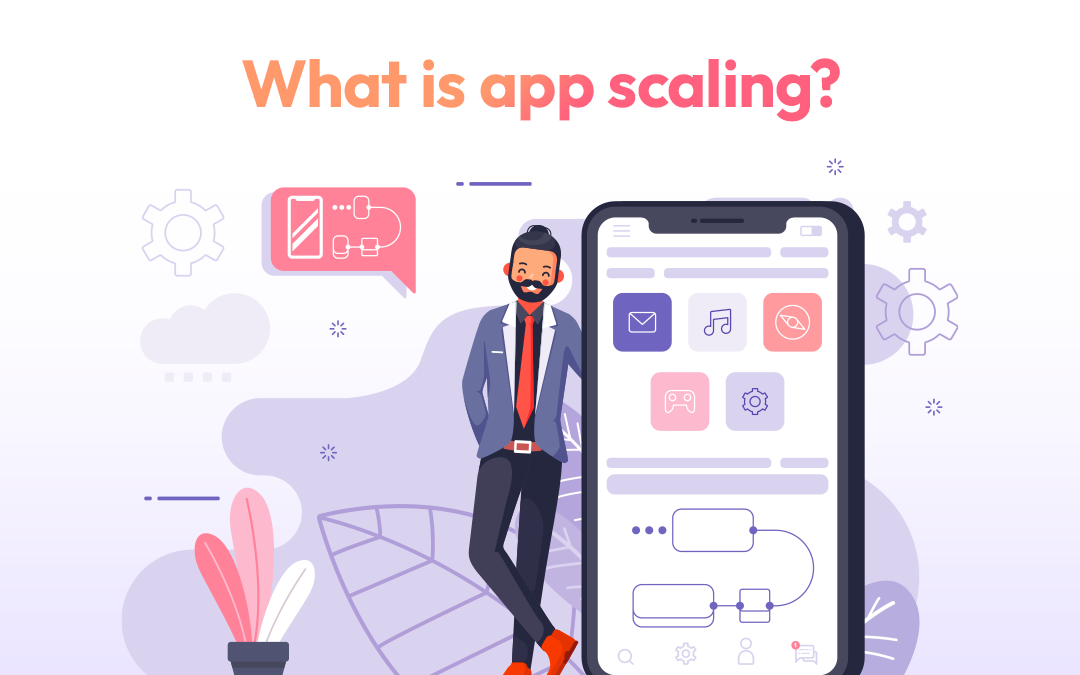
What is App Scaling? And Why does it matter in 2024?
App scaling is critical for the growth and success of your app. Learn why and how to scale your application to entice user demand and achieve business goals.
Let's imagine you are doing a taxi booking business through an app, all at once the app gets quite popular around your region. And the user counts kept constantly surging without any dip.
Your app can’t take the sudden rise. It may slow down or create other performance issues.
What do you do in this current chaos?
You need to scale your app, right? You don’t have any other option than doing so.
No worries, the blog won't be long. We cut the fluff and have come to give a straightforward exploration of app scaling and why it matters.
Let’s go!
What is app scaling?
It is the process of making your app handle more users and data. So your app won't lag in the aspect of its performance. For instance, when your app encounters heavy user traffic, which can then lead to slower response time, crashes, and errors. It's where app scaling plays a key role.
App scaling ensures that your app does fine without compromising performance.
Let me put it another way. What if you didn’t scale your app?
It can result in a poor app experience and your user may feel "I am done here".
App scaling tackles the situation of sudden spikes and downtime. Therefore you can maintain a positive user experience throughout the journey.
There are several ways to do that; hold still, and we are getting there.
Why does app scaling matter?
1. Performance
When your app witnesses an increasingly sudden spike of users or data, it may respond slowly or be unresponsive. App scaling ensures that your app can go through the rough path and can emerge from giving a disastrous performance.
2. User experience
You may notice nowadays that brands deliver super-fast user experiences. If your app is slow or doesn't please your user's expectations, they may look for alternatives. Therefore you end up losing your long-term users. Scaling your app gives you the potential to maintain a better user experience.
3. Surpass your competitors
We are in a competitive world where AI bots keep simplifying our tasks drastically. The point here is 'Technologies have advanced', and we need to be right on track. If you're lagging, you're letting your competitor take advantage of it.
To sum up, app scaling is critical to ensure that your app can hold increased traffic, provides a hassle-free environment, and gives you a competitive edge.
Are you looking for a tech partner?
Get 30-min interactive session to discuss your queries, get a product demo, and more!
Types of app scaling techniques?
1. Vertical scaling
It is the process of adding more hardware resources to a machine such as CPU, memory, or storage to the server. It looks advantageous as it cost less than purchasing a new server. However, we can only increase it to some extent. As time pass, we need to get on the horizontal scaling.
2. Horizontal scaling
It encompasses the process of adding more machines to divide the workload. All this would take a minimum time; however, the process is indeed expensive as we need to integrate the same size server into existing machines.
3. Load balancing
It means distributing traffic across multiple resources to prevent it from getting overloaded. It ensures that the app resources are utilized effectively.
It works between app users and app servers and distributes the traffic based on its pre-written rules and algorithms. The rules hold several factors like server capacity, availability, and server response time.
4. Caching
Caching involves storing frequently accessed data so it can redeem data without requesting a database. Doing so can improve the responsive time of an app. It can be more effective when the client instance reads over the same data repeatedly.
5. Database optimization
The application relies on a database. It's obvious when the application grows - the database happens to grow.
Database optimization improves the performance and scalability of the system. There are several ways to achieve the goal of database optimization.
They are:
✳️ Index optimization
It is to speed up the database queries by providing quick access to the data. So, it reduces the time that needs to retrieve from the database.
✳️ Query optimization
It indulges the process of improving the efficiency of the database queries to handle huge traffics and data volumes.
Query optimization identifies and addresses the performance issues by analyzing how the query is executed, identifying ineffective queries, and optimizing the database schema to improve query performance.
✳️ Compression
It is the process of reducing the storage (data that needs to be read from the disk) requirements of the database to improve the query performance.
End note
Nowadays, businesses are serving their users with an app and it's become crucial to serve them with zeal. However, from a business perspective, we need to furnish a worthwhile experience to get hold of the user's interest.
More than an app design, and straightforward navigation, users are more considered in their app experience. And that gives them a choice on whether to continue the relationship with the brand or not.
So, app scaling is a lifesaver.
Are you probing to build a scalable application? Check out the readymade marketplace platform; we have various readymade application that is ever-evolving as business scales.
Let me assume that this blog does good for you to know about app scaling.






